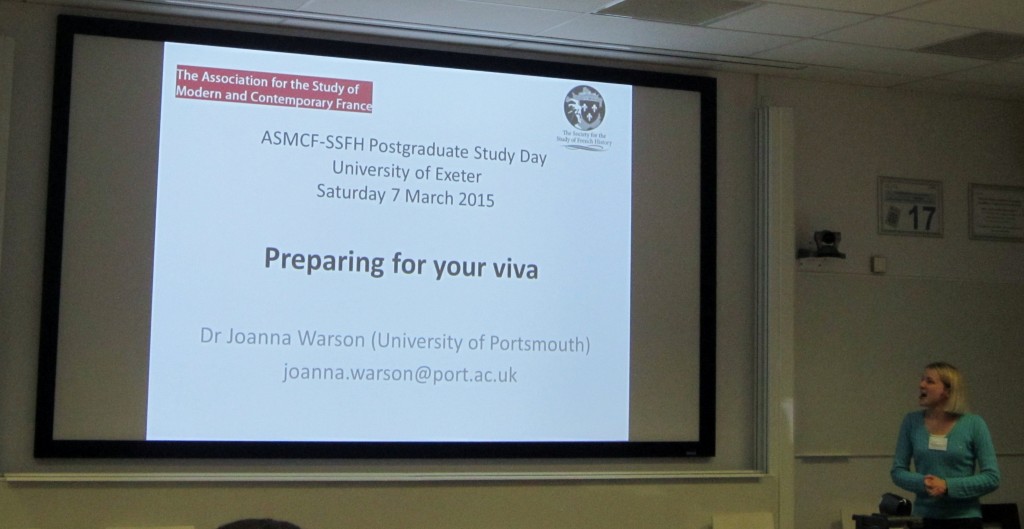Report on the ASMCF / SSFH Postgraduate Study Day at the University of Exeter, 7th March 2015
by Dr Thomas Martin, part-time lecturer in French at the University of Leeds
The study day took place on a bright early spring day in Exeter, with an intriguing and eclectic set of papers programmed under the heading of ‘the Global and the Local’, topics ranging from West African cinema to the links between globalisation and rugby. I have been asked by the organisers to write a report on the day from the perspective of someone attending the event, which led to a certain amount of deliberation on how to approach doing this. I eventually decided against writing a straight chronological account, because there is a danger of it ending up resembling a primary-age school trip report (‘… and then I watched this presentation, and then I watched this presentation, and then I had a cup of coffee, and then…’). Instead, I will base the report around answering this question: why was it worth attending the study day? The answers to this question provide three interlinked points which enable me to relate my experience of the event thematically.


The first reason I’d give for attending the study day was that it was an opportunity to learn something. I have attended plenty of conferences – I’m now at the stage of having finished my PhD – but this never stops being the case. It is in the nature of postgraduate study to encourage a one-track mind: a tight focus on your own subject. As I touched upon above, attending the study day allowed me a break from this, and an opportunity to see what else is happening in the field. I would, for instance, now be able to drop into conversation the basics on workers’ housing in nineteenth-century Mulhouse (courtesy of Will Clement), or the French government’s production of material promoting the Algerian Sahara as a tourist destination (courtesy of Kelsey Suggitt). Over and above simple interest, however, there is always the possibility of seeing links between your own work and that of the presenters. In my case for example, throughout Claire Eldridge’s fascinating keynote on the memorialisation of the Algerian War in contemporary France I was reminded of the discussion in my thesis of different anti-racist movements’ discourse on the colonial past (as I mentioned in my conversation with her afterwards, along with my recent paper on the subject for Modern and Contemporary France, in the interests of self-promotion). An event like this also offers, of course, the possibility of learning by experience, whether by presenting a paper to a knowledgeable but supportive audience or, as with myself, chairing a panel and therefore needing to introduce speakers, come up with potential questions for discussion and make sure everything runs to time.

At least as important as this, if not more so, is the social aspect. Just as writing a PhD thesis can result in a narrow focus on your own subject to the exclusion of anything else, it can at times be a solitary affair. An event like this, with a friendly, low-key environment, is ideal as a means of feeling to be part of an academic community. I would wholeheartedly advise postgraduate students to attend ‘full’ conferences as well as study days, but the atmosphere is inevitably slightly different: the vast majority of people are welcoming and you have the opportunity to mix with senior academics and the ‘big names’ of the field, but at the same time there is perhaps more formality and less of the sense of camaraderie that comes from all being in the same boat. At Exeter however, in the process of informal discussions over coffee and bites of lunch – I was largely preoccupied with preparing for the session I was chairing immediately afterwards so didn’t get around to much more – I met several people I’m intending to keep in touch with and plenty more I’ll be happy to see again on the academic circuit. This sense of conviviality was only enhanced after the conference: a large group of us – anyone who didn’t have a train to catch, basically – went on to a very good independent pub-restaurant nearby for drinks and a meal (for what it’s worth, which isn’t a lot, I had butternut squash soup followed by pork belly on Puy lentils cooked in red wine, and a pint of local cider).

The mentions of friendliness, camaraderie and conviviality above bring me on to my final reason that it’s worth attending – for support in the process of doing a PhD. Support in the professional development sense to some extent (the sessions on getting published, for example), but first and foremost, support in the sense of sharing advice and encouragement about how to approach what is obviously a substantial undertaking: to devise, research and write a book-length project whilst having, for the most part, to organise and motivate yourself. As I mentioned earlier, I have now finished my PhD, so on several occasions I found myself offering reassurance on various parts of the process from the perspective of having done them. This was the case, for example, with the viva, where much of my advice echoed that of Joanna Warson in her clear, common-sense presentation on the subject: consider having a mock viva first, remember that you’re the expert on your subject, remember that the examiners don’t want you to fail, and so on.

In summary then, a useful and enjoyable day. Thanks to Lori, Stacie, Mason and Ellen for putting everything together, and I would happily recommend such events in the future to any postgraduates who would like to present and discuss their research in a friendly and supportive environment.


